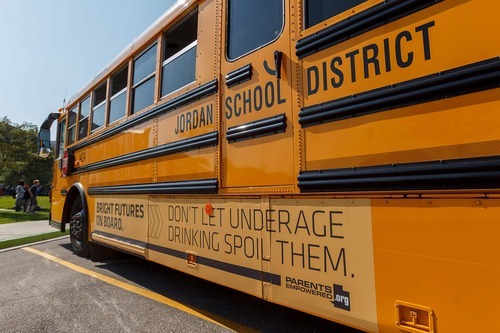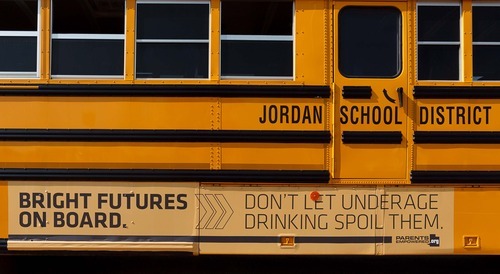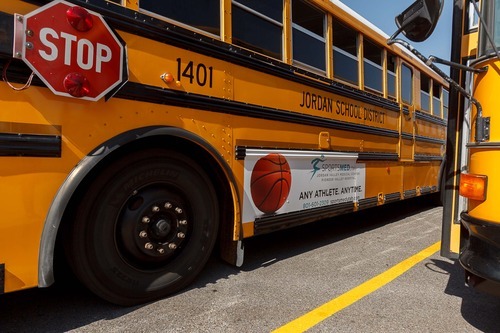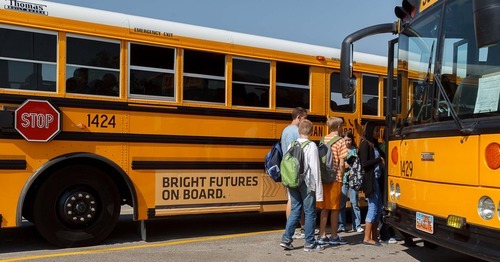This is an archived article that was published on sltrib.com in 2012, and information in the article may be outdated. It is provided only for personal research purposes and may not be reprinted.
West Jordan • In a swirl of noise and color, hundreds of Sunset Ridge Middle School students streamed across the school lawn into bright yellow buses waiting to take them home.
They boarded oblivious to advertisements marking several of the buses: an ad for sports medicine clinics, two ads for a power company.
"It's all right," said seventh-grader Trevor Davies of the ads. "It doesn't affect me."
Kids might not be paying much attention to the ads, but the revenue they're bringing in for the Jordan School District has piqued interest among other Utah school leaders, who may soon sell advertising for their buses too.
After about six months of running the ads, Jordan has already earned $35,000, of which $22,000 may be spent in-house with the rest going to the district's advertising company. Jordan became the first district in the state this year to start putting ads on buses, following the passage of a 2011 law that allows the practice. A number of other states also allow bus ads.
"The nice thing about the advertising is it's a revenue source for school districts that doesn't tap into taxpayers having to pay additional taxes," said Herb Jensen, Jordan director of transportation.
Jensen is optimistic the ads will bring in even more money now that the school year has officially started. He said ad sales got off to a slow start in April, with companies hesitant to invest knowing summer break was just around the corner. So far,more than 20 Jordan buses bear ads out of the district'sfleet of more than 200.
According to the new law, created by Rep. Jim Bird, R-West Jordan, school districts are supposed to put money earned from ads back into transportation. But Jensen said if the district has to put less money into transportation, because of ad revenue, that could mean more money for other things.
The law stipulates that ads placed on school buses can't promote drugs, alcohol, gambling or political issues. They may not include sexual material or resemble traffic control devices, and must take up no more than 35 percent of the side of a bus.
Jensen said Jordan gets final approval on bus ads, and so far, the district has not had to turn down any ideas.
At least two Utah school districts — Granite and Davis — are watching Jordan's experiences with the ads closely, as they consider emulating the effort.
"The legislature gave school districts the opportunity to do it, and they saw what the Jordan School District had done and they said, 'Let's just test the water and see what we find out,'" said Christopher Williams, a Davis spokesman, of the Davis school board.
Williams said Davis is now working on a request for proposals from advertising agencies. He said the district already put out a request once, but only received one response. The district is rewriting a second proposal seeking additional bids.
"The first question we want to answer is, 'How much money can it generate?'" Williams said. "Of course our No. 1 challenge is class size, so if we could put a teacher out in front of students that would be wonderful." Davis has about 246 buses, Williams said.
Granite is also watching and waiting.
Ben Horsley, a Granite spokesman, said the district is looking for vendors to produce bus ads as a pilot program. Horsley said Granite is trying to see if there's a way to keep 80 percent of any revenue generated by bus ads. He said even $35,000 — the amount raised by Jordan — could be enough to pay for about half of a teacher's compensation each year.
So far Jordan's efforts have met with tacit approval from parents despite a bumpy ride to legislative passage in 2011. The bill, HB199, passed in 2011 despite concerns from some about safety, that it would force the private sector to compete with schools and that ads could confuse children into thinking their schools endorsed various products or services.
But a number of Jordan parents picking up their kids from Sunset on a recent day said they don't mind the ads — and many hadn't even noticed them.
"It doesn't bother me in the least," said grandparent Kent Wilson. "They keep them pretty subtle. Plus, anything they can do to get a little more money in school districts is probably a good thing."
Nicole Greene said the ads are fine with her as well, as long as they remain appropriate.
"It's a way for them to earn money," Green said, "so they can have well-running buses."
Not that it hasn't taken some parents some getting used to.
"I think it's a bit odd," said Trevor Davies' mother Sherri Davies. "I'm not used to seeing it."
But she said if it's helping the district financially, she doesn't see any harm.
Twitter: @lschencker











